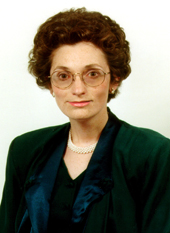

Nancy Makri

Born September 5, 1962 in Athens, Greece.
Edward William and Jane Marr Gutgsell Professor of Chemistry and Physics, University of Illinois at Urbana–Champaign
Email:nmakri@illinois.edu
Web: external link
Junior Fellow, Society of Fellows, Harvard University, 1989–91. Beckman Young Investigator Award, Arnold and Mabel Beckman Foundation, 1993. National Science Foundation Young Investigator Award, 1993. Packard Fellowship for Science and Engineering, David and Lucile Packard Foundation, 1993. Sloan Research Fellowship, Alfred Sloan Foundation, 1994. Cottrell Scholar Award, Research Corporation, 1994. Annual Medal of the International Academy of Quantum Molecular Science, 1995. Camille Dreyfus Teacher–Scholar Award, The Camille and Henry Dreyfus Foundation, 1997. Fellow, American Association for the Advancement of Science, 1998. Agnes Fay Morgan Research Award, Iota Sigma Pi, 1999. Academic Prize in Physical Sciences, Bodossaki Foundation, 2000. Fellow, American Physical Society, 2001. Divisional Associate Editor, Physical Review Letters, 2003–2005. Advisory Editorial Board, Journal of Computational Chemistry, 2005–. Editorial Advisory Board, Journal of Chemical Theory and Computation, 2005–. Editorial Board, The Journal of Chemical Physics, 2009–.
Author of:
Important Contributions:
- Path integral methods for quantum dissipative systems: Makri has pioneered an iterative path integral methodology that allows numerically exact description of systems in harmonic dissipative environments, circumventing the Monte Carlo sign problem. Makri's seminal study of reaction rates in dissipative baths led to a thorough understanding of barrier crossing kinetics as a result of the interplay among tunneling, phase interference and dissipation. Her numerical path integral results on model double well potentials continue to serve as benchmarks in that field, and her studies of driven spin-boson systems have revealed new possibilities for quantum control. Application of this path integral methodology to the dynamics of charge separation in bacterial photosynthesis played an important role in elucidating the specifics of biological electron transfer.
- Forward-backward semiclassical dynamics of quantum fluids: Makri has also advanced the implementation of time-dependent semiclassical theory, using a paired forward-backward trajectory description to temper the oscillatory character of the integrand. This approach leads to quasiclassical-like descriptions of time correlation functions that capture essential deviations from classical behavior through quantum dispersion, zero-point motion, or Bose statistical exchange of identical particles. Her recent simulation of normal and superfluid helium dynamics, the first of its kind, obtained excellent agreement with experimental neutron scattering profiles and led to novel insights into the intricate role of Bose exchange on the dynamic response of this system.